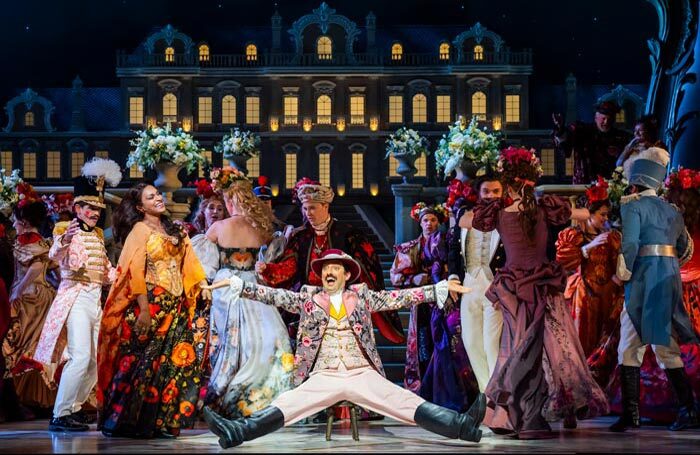
“Marvellous central performances ”
JUN 10, 2024
BY GEORGE HALL
GLYNDEBOURNE, LEWES
Glyndebourne’s staging delivers, despite an uneven balance between comedy and romance

Cal McCrystal’s staging is the first at Glyndebourne of this Lehár 1905 classic. As with his operetta stagings for English National Opera – HMS Pinafore and Iolanthe – McCrystal goes full steam ahead for comedy in a piece that also has its sentimental side. Here, the two romantic relationships at the centre require at least some serious treatment. For much of the time we laugh heartily at McCrystal’s comic routines; at others, he needs to rein it in. The treatment of the second couple – respectably married Valencienne and young aristocrat Camille de Rosillon, whose gorgeous duet is a romantic highlight – substitutes uproarious sexual shenanigans in silhouette for the heartache and genuine eroticism of their illicit relationship. It’s as if there are two simultaneous productions running at this point – one musical, one visual – with the second drowning out the first.
But while the first act doesn’t fire on all cylinders (its extensive dialogue would benefit from cuts), from the moment the curtain goes up on Act II – the Pontevedrian folk festival at Hanna’s house – Gary McCann’s enchanting sets and costumes, Carrie-Anne Ingrouille’s intricate, immaculately executed choreography and the marvellous central performances at the heart of the piece all win us over.
It’s difficult to think of another artist with the myriad gifts necessary to fascinate as Hanna the way that Danielle de Niese does: hers is a consummate realisation, ideally matched by the stylish matinee-idol persona of German Olvéra’s Danilo, his baritone an exceptional instrument. Soraya Mafi brings depth and vocal freshness to Valencienne, but while appealingly sung, Michael McDermott’s Camille is a touch stiff.
Two mainly speaking roles are brilliantly done. Thomas Allen’s Baron Zeta has acres of dialogue heavy with plot points but turns in a class act in speech as well as in his comic dance routines. There’s rather a lot of Tom Edden’s embassy secretary Njegus, with some lengthy new comic introductions to individual scenes, plus a rarely heard song added for the first London production in 1907; but he’s so funny that it seems ungrateful to suggest that there may be a little too much of him.
The new book and lyrics by Stephen Plaice and Marcia Bellamy are expertly crafted, even if they introduce vulgarities that would never have made it past the Lord Chamberlain back in 1907. And there is a huge amount to enjoy in this colourful and clever entertainment set to music that, as conductor John Wilson and the London Philharmonic Orchestra consistently demonstrate, stands right at the peak of the entire realm of operetta.


Leave a Reply